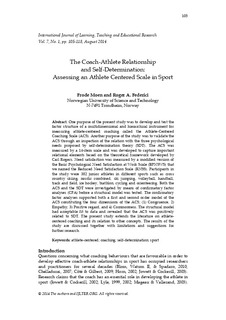The Coach-athlete relationship and Self-determination: Assessing an Athlete Centered Scale in sport
Journal article, Peer reviewed
Published version

Åpne
Permanent lenke
http://hdl.handle.net/11250/2626907Utgivelsesdato
2014Metadata
Vis full innførselSamlinger
Originalversjon
International Journal of Learning, Teaching and Educational Research (ILJTER). 2014, 7 (1), 105-118.Sammendrag
One purpose of the present study was to develop and test the factor structure of a multidimensional and hierarchical instrument for measuring athlete-centered coaching called the Athlete-Centered Coaching Scale (ACS). Another purpose of the study was to validate the ACS through an inspection of the relation with the three psychological needs proposed by self-determination theory (SDT). The ACS was measured by a 16-item scale and was developed to capture important relational elements based on the theoretical framework developed by Carl Rogers. Need satisfaction was measured by a modified version of the Basic Psychological Need Satisfaction at Work Scale (BPNSWS) that we named the Reduced Need Satisfaction Scale (RNSS). Participants in the study were 382 junior athletes in different sports such as cross country skiing, nordic combined, ski jumping, volleyball, handball, track and field, ice hockey, biathlon, cycling and orienteering. Both the ACS and the SDT were investigated by means of confirmatory factor analyses (CFA) before a structural model was tested. The confirmatory factor analyses supported both a first and second order model of the ACS constituting the four dimensions of the ACS; (1) Congruence, 2) Empathy, 3) Positive regard, and 4) Commonness. The structural model had acceptable fit to data and revealed that the ACS was positively related to SDT. The present study extends the literature on athlete-centered coaching and its relation to other concepts. The results of the study are discussed together with limitations and suggestions for further research.